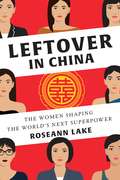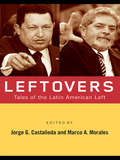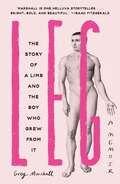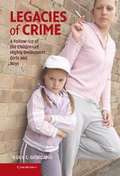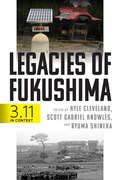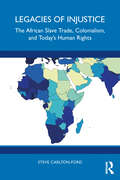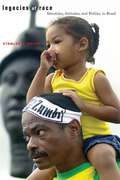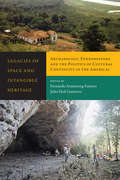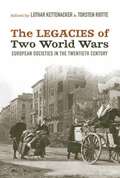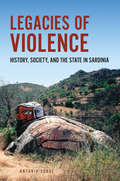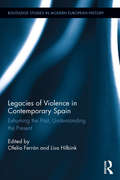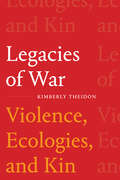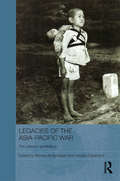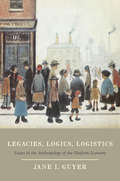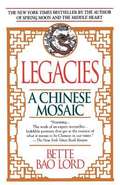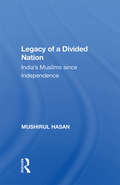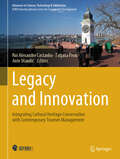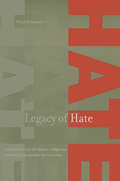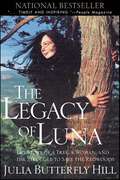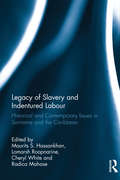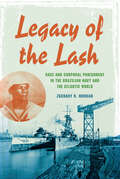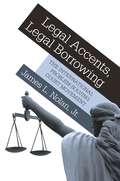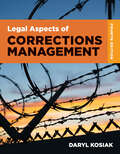- Table View
- List View
Leftover in China: The Women Shaping The World's Next Superpower
by Roseann LakeFactory Girls meets The Vagina Monologues in this fascinating narrative on China’s single women—and why they could be the source of its economic future. Forty years ago, China enacted the one-child policy, only recently relaxed. Among many other unintended consequences, it resulted in both an enormous gender imbalance—with a predicted twenty million more men than women of marriage age by 2020—and China’s first generations of only-daughters. Given the resources normally reserved for boys, these girls were pushed to study, excel in college, and succeed in careers, as if they were sons. Now living in an economic powerhouse, enough of these women have decided to postpone marriage—or not marry at all—to spawn a label: "leftovers." Unprecedentedly well-educated and goal-oriented, they struggle to find partners in a society where gender roles have not evolved as vigorously as society itself, and where new professional opportunities have made women less willing to compromise their careers or concede to marriage for the sake of being wed. Further complicating their search for a mate, the vast majority of China’s single men reside in and are tied to the rural areas where they were raised. This makes them geographically, economically, and educationally incompatible with city-dwelling “leftovers,” who also face difficulty in partnering with urban men, given the urban men’s general preference for more dutiful, domesticated wives. Part critique of China’s paternalistic ideals, part playful portrait of the romantic travails of China’s trailblazing women and their well-meaning parents who are anxious to see their daughters snuggled into traditional wedlock, Roseann Lake’s Leftover in China focuses on the lives of four individual women against a backdrop of colorful anecdotes, hundreds of interviews, and rigorous historical and demographic research to show how these "leftovers" are the linchpin to China’s future.
Leftovers: Tales of the Latin American Left
by Jorge G. Castañeda Marco A. MoralesOver a decade ago, Jorge Castañeda wrote the classic Utopia Unarmed, which offered a penetrating and comprehensive account of the Latin American left’s fate at the end of the Cold War. Since then, the left across Latin America has travelled in paths no one could have predicted. Latin American nations from Mexico to Argentina wavered for years between leftism and American-supported neoliberalism, but in recent years the left has experienced a tremendous resurgence throughout the region. However, the left is not unified, and as Castañeda, Morales, and their contributors show, it has followed two distinct paths – a more cosmopolitan style leftism, exemplified by Brazil and Chile, and a left fuelled by populist nationalism that has clear debts to Perón or Cárdenas, and is most evident in Venezuela, Mexico’s PRD, Bolivia, and Argentina. Leftovers comprehensively updates this very important story, with country and area specialists contributing.
Leg: The Story of a Limb and the Boy Who Grew from It
by Greg Marshall* A MOST-ANTICIPATED SUMMER READ SELECTED BY * Washington Post *Buzzfeed * Bustle * The Advocate * LitHub * Bookriot * Electric Literature * and more!*A hilarious and poignant memoir grappling with family, disability, and coming of age in two closets-as a gay man and as a man living with cerebral palsy'Leg is intimate (and I mean that in all ways), insightful, and often laugh-out-loud funny.' - SCOTT SIMON, NPR'One hell of an entertaining book.' - BUZZFEED, Most Anticipated LGBTQ+ Books of 2023'Greg Marshall is one helluva storyteller . . . bright, bold, and beauitful.' -ISAAC FITZGERALD'A strange, smutty, hilarious, beautiful, compassionate, provoking, big-hearted, sharp-tongued, original, brilliant memoir. I hated to see it end.' - ELIZABETH McCRACKENGreg Marshall's early years were pretty bizarre. Rewind the VHS tapes (this is the nineties) and you'll see a lopsided teenager limping across a high school stage, or in a wheelchair after leg surgeries, pondering why he's crushing on half of the Utah Jazz. Add to this home video footage a mom clacking away at her newspaper column between chemos, a dad with ALS, and a cast of foulmouthed siblings. Fast forward the tape and you'll find Marshall happily settled into his life as a gay man only to discover he's been living in another closet his whole life: he has cerebral palsy. Here, in the hot mess of it all, lies Greg Marshall's wellspring of wit and wisdom.Leg is an extraordinarily funny and insightful memoir from a daring new voice. Packed with outrageous stories of a singular childhood, it is also a unique examination of what it means to transform when there are parts of yourself you can't change, a moving portrait of a family in crisis, and a tale of resilience of spirit. In Marshall's deft hands, we see a story both personal and universal-of being young and wanting the world, even when the world doesn't feel like yours to want.
Legacies of British Slave-Ownership
by Catherine Hall Catherine Hall Nicholas Draper Keith McClelland Katie Donington Rachel Lang Nicholas Draper Keith Mcclelland Katie DoningtonThis book re-examines the relationship between Britain and colonial slavery in a crucial period in the birth of modern Britain. Drawing on a comprehensive analysis of British slave-owners and mortgagees who received compensation from the state for the end of slavery, and tracing their trajectories in British life, the volume explores the commercial, political, cultural, social, intellectual, physical and imperial legacies of slave-ownership. It transcends conventional divisions in history-writing to provide an integrated account of one powerful way in which Empire came home to Victorian Britain, and to reassess narratives of West Indian 'decline'. It will be of value to scholars not only of British economic and social history, but also of the histories of the Atlantic world, of the Caribbean and of slavery, as well as to those concerned with the evolution of ideas of race and difference and with the relationship between past and present.
Legacies of Crime
by Peggy C. GiordanoLegacies of Crime explores the lives of seriously delinquent girls and boys who were followed over a twenty-year period as they navigated the transition to adulthood. In-depth interviews with these women and men and their children - a majority now adolescents themselves - depict the adults' economic and social disadvantages and continued criminal involvement, and in turn the unique vulnerabilities of their children. Giordano identifies family dynamics that foster the intergenerational transmission of crime, violence, and drug abuse, rejecting the notion that such continuities are based solely on genetic similarities or even lax, inconsistent parenting. The author breaks new ground in directly exploring - and in the process revising - the basic tenets of classic social learning theories, and confronting the complications associated with the parent's gender. Legacies of Crime also identifies factors associated with resilience in the face of what is often a formidable package of risks favoring intergenerational continuity.
Legacies of Fukushima: 3.11 in Context (Critical Studies in Risk and Disaster)
by Kyle Cleveland, Scott Gabriel Knowles and Ryuma ShinehaIt was an unlikely convergence of events. A 9.0 magnitude earthquake, the largest in Japanese memory and the fourth largest recorded in world history; a tsunami that peaked at forty meters, devastating the seaboard of northeastern Japan; three reactors in meltdown at the Daiichi nuclear power plant in Fukushima; experts in disarray and suffering victims young and old. It was, as well, an unlikely convergence of legacies. Submerged traumas resurfaced and communities long accustomed to living quietly with hazards suddenly were heard. New legacies of disaster were handed down, unfolding slowly for generations to come.The defining disaster of contemporary Japanese history still goes by many different names: The Great East Japan Earthquake; the 2011 Tōhoku Earthquake and Tsunami; the Fukushima Daiichi Nuclear Disaster; the 3.11 Triple Disaster. Each name represents a struggle to place the disaster on a map and fix a date to a timeline. But within each of these names hides a combination of disasters and legacies that converged on March 11, 2011, before veering away in all directions: to the past, to the future, across a nation, and around the world. Which pathways from the past will continue, which pathways ended with 3.11, and how are these legacies entangled?Legacies of Fukushima places these questions front and center. The authors collected here contextualize 3.11 as a disaster with a long period of premonition and an uncertain future. The volume employs a critical disaster studies approach, and the authors are drawn from the realms of journalism and academia, science policy and citizen science, activism and governance—and they come from East Asia, America, and Europe. 3.11 is a Japanese legacy with global impact, and the authors and their methods reflect this diversity of experience.Contributors: Sean Bonner, Azby Brown, Kyle Cleveland, Martin Fackler, Robert Jacobs, Paul Jobin, Kohta Juraku, Tatsuhiro Kamisato, Jeff Kingston, William J. Kinsella, Scott Gabriel Knowles, Robert Jay Lifton, Luis Felipe R. Murillo, Başak Saraç-Lesavre, Sonja D. Schmid, Ryuma Shineha, James Simms, Tatsujiro Suzuki, Ekou Yagi.
Legacies of Injustice: The African Slave Trade, Colonialism, and Today’s Human Rights
by Steve Carlton-FordThis book examines the impact of the African slave trade and colonialism on political, civil, economic, social, and environmental human rights. Using multiple combined data sets, the book demonstrates that many contemporary human rights issues stem from the impact of the African slave trade and subsequent colonialism as well as the disruption of economic and political development in colonies.Unlike other books concerning human rights, this book views contemporary human rights issues from both historical and sociological vantage points. This important book will be of interest to students studying in courses covering human rights, Africa and Africana studies and history, comparative ethnic studies, historical sociology, and global studies of the African slave trade.
Legacies of Race: Identities, Attitudes, and Politics in Brazil
by Stanley R. BaileyMost of our understanding of Brazilian racial attitudes, according to Bailey (sociology, U. of California at Irvine), come either from studies of elite attitudes or from localized ethnographies, leaving us with little understanding of the racial attitudes of the Brazilian masses. He fills the gap in the literature by analyzing the "racial common sense" captured in three major surveys of racial attitudes: the 1995 DataFolha national sample survey of racial attitudes, the 2000 CEAP/DataUff survey of racial attitudes in the state of Rio de Janeiro, and the 2002 PESB national social survey. He also provides comparative context concerning the changing nature of racial attitudes in the United States. Annotation ©2009 Book News, Inc., Portland, OR (booknews.com)
Legacies of Space and Intangible Heritage: Archaeology, Ethnohistory, and the Politics of Cultural Continuity in the Americas
by Fernando Armstrong-Fumero and Julio Hoil GutierrezLegacies of Space and Intangible Heritage is an interdisciplinary exploration of the intersections between the study and management of physical sites and the reproduction of intangible cultural legacies. The volume provides nine case studies that explore different ways in which place is mediated by social, political, and ecological processes that have deep historical roots and that continue to affect the politics of heritage management. Spaces of human habitation are both historical records of the past and key elements in reproducing the knowledge and values that define lives in the present. Practices, knowledge, and skills that communities recognize as part of their culture—and that a range of legal statutes define as protected intangible heritages—are threatened by increased migration, the displacement of indigenous peoples, and limits on access to culturally or historically significant sites. This volume addresses how different physical environments contribute to the reproduction of cultural forms even in the wake of these processes of displacement and change. Case studies from North and South America reveal a pattern of abandonment and reestablishment of settlements and show how collective memory drives people back to culturally meaningful sites. This tendency for communities to return to the sites that shaped their collective histories, along with the growing importance granted to intangible heritage, challenges archaeologists and other heritage workers to find new ways of incorporating the cultural legacies that link societies to place into the work of research and stewardship. By examining the politics of cultural continuity through the lenses of archaeology and ethnohistory, Legacies of Space and Intangible Heritage demonstrates this complex relationship between a people’s heritage and the landscape that affects the making of "place." Contributors: Rani Alexander, Hannah Becker, Minette Church, Bonnie Clark, Chip Colwell, Winifred Creamer, Emiliana Cruz, T. J. Ferguson, Julio Hoil Gutierrez, Jonathan Haas, Saul Hedquist, Maren Hopkins, Stuart B. Koyiyumptewa, Christine Kray, Henry Marcelo Castillo, Anna Roosevelt, Jason Yaeger, Keiko Yoneda
Legacies of Two World Wars, The
by Torsten Riotte Lothar KettenackerThe US invasion of Iraq in 2003 was done mainly, if one is to believe US policy at the time, to liberate the people of Iraq from an oppressive dictator. However, the many protests in London, New York, and other cities imply that the policy of "making the world safe for democracy" was not shared by millions of people in many Western countries. Thinking about this controversy inspired the present volume, which takes a closer look at how society responded to the outbreaks and conclusions of the First and Second World Wars. In order to examine this relationship between the conduct of wars and public opinion, leading scholars trace the moods and attitudes of the people of four Western countries (Great Britain, France, Germany and Italy) before, during and after the crucial moments of the two major conflicts of the twentieth century. Focusing less on politics and more on how people experienced the wars, this volume shows how the distinction between enthusiasm for war and concern about its consequences is rarely clear-cut.
Legacies of Violence
by Antonio SorgeThe inhabitants of highland Sardinia proudly declare a long history of resistance to outside authority. Many even celebrate the belief that "not even the Roman Empire reached this far." Yet, since the late nineteenth century, the Italian government has pacified and integrated the mountain districts of the island into the state, often through the use of force.In Legacies of Violence, Antonio Sorge examines local understandings of this past and the effects that a history of violence exercises on collective representations. This is particularly the case among the shepherds of the island, who claim to embody an ancient code of honour known as balentia that they allege to be uncorrupted by the values of mainstream Italian society. A perceptive ethnography of the mobilization of history in support of a way of life that is disappearing as the region's inhabitants adopt a more mobile, cosmopolitan, and urbane lifestyle, Sorge's work demonstrates how social memory continues to shape the present in the Sardinian highlands.
Legacies of Violence in Contemporary Spain: Exhuming the Past, Understanding the Present (Routledge Studies in Modern European History #32)
by Ofelia Ferrán Lisa HilbinkThis book provides a comprehensive, interdisciplinary study of the multiple legacies of Francoist violence in contemporary Spain, with a special focus on the exhumations of mass graves from the Civil War and post-war era. The various contributions frame their study within a broader reflection on the nature, function and legacies of state-sanctioned violence in its many forms. Offering perspectives from fields as varied as history, political science, literary and cultural studies, forensic and cultural anthropology, international human rights law, sociology, and art, this volume explores the multifaceted nature of a society’s reckoning with past violence. It speaks not only to those interested in contemporary Spain and Western Europe, but also to those studying issues of transitional and post-transitional justice in other national and regional contexts.
Legacies of War: Violence, Ecologies, and Kin
by Kimberly TheidonIn Legacies of War Kimberly Theidon examines the lives of children born of wartime rape and the experiences of their mothers and communities to offer a gendered theory of harm and repair. Drawing on ethnographic research in postconflict Peru and Colombia, Theidon considers the multiple environments in which conception, pregnancy, and childbirth unfold. She reimagines harm by taking into account the impact of violence on individual people as well as on more-than-human lives, bodies, and ecologies, showing how wartime violence reveals the interdependency of all life. She also critiques policy makers, governments, and humanitarian organizations for their efforts at postconflict justice, which frequently take an anthropocentric rights-based approach that is steeped in liberal legalism. Rethinking the intergenerational reach of war while questioning what counts as sexual and reproductive violence, Theidon calls for an explicitly feminist peace-building and postconflict agenda that includes a full range of sexual and reproductive rights, including access to safe and affordable abortions.
Legacies of the Asia-Pacific War: The Yakeato Generation (Routledge Contemporary Japan Series)
by Yasuko Claremont Roman RosenbaumWhen we look in detail at the various peripheral groups of disenfranchised people emerging from the aftermath of the Asia–Pacific War the list is startling: Koreans in Japan (migrants or forced labourers), Burakumin, Hibakusha, Okinawans, Asian minorities, comfort women and many others. Many of these groups have been discussed in a large corpus of what we may call ‘disenfranchised literature’, and the research presented in this book intends to add an additional and particularly controversial example to the long list of the voice- and powerless. The presence of members of what is known as the yakeato sedai or the generation of people who experienced the fire-bombings of the Asia–Pacific War is conspicuous in all areas of contemporary Japan. From literature to the visual arts, from music to theatre, from architecture to politics, their influence and in many cases guiding principles is evident everywhere and in many cases forms the keystone of modern Japanese society and culture. The contributors to this book explore the impact of the yakeato generation - and their literary, creative and cultural and works - on the postwar period by drawing out the importance of the legacy of those people who truly survived the darkest hour of the twentieth century and re-evaluate the ramifications of their experiences in contemporary Japanese society and culture. As such this book will be of huge interest to those studying Japanese history, literature, poetry and cultural studies.
Legacies, Logics, Logistics: Essays in the Anthropology of the Platform Economy
by Jane I. GuyerLegacies, Logics, Logistics brings together a set of essays, written both before and after the financial crisis of 2007-08, by eminent Africanist and economic anthropologist Jane I. Guyer. Each was written initially for a conference on a defined theme. When they are brought together and interpreted as a whole by Guyer, these varied essays show how an anthropological and socio-historical approach to economic practices--both in the West and elsewhere--can illuminate deep facets of economic life that the big theories and models may fail to capture. Focusing on economic actors--whether ordinary consumers or financial experts--Guyer traces how people and institutions hold together past experiences (legacies), imagined scenarios and models (logics), and situational challenges (logistics) in a way that makes the performance of economic life (on platforms made of these legacies, logics, and logistics) work in practice. Individual essays explore a number of topics--including time frames and the future, the use of percentages in observations and judgments, the explanation of prices, the coexistence of different world currencies, the reapplication of longtime economic theories in new settings, and, crucially, how we talk about the economy, how we use stable terms to describe a turbulent system. Valuable as standalone pieces, the essays build into a cogent method of economic anthropology.
Legacies, Logics, Logistics: Essays in the Anthropology of the Platform Economy
by Jane I. GuyerLegacies, Logics, Logistics brings together a set of essays, written both before and after the financial crisis of 2007-08, by eminent Africanist and economic anthropologist Jane I. Guyer. Each was written initially for a conference on a defined theme. When they are brought together and interpreted as a whole by Guyer, these varied essays show how an anthropological and socio-historical approach to economic practices--both in the West and elsewhere--can illuminate deep facets of economic life that the big theories and models may fail to capture. Focusing on economic actors--whether ordinary consumers or financial experts--Guyer traces how people and institutions hold together past experiences (legacies), imagined scenarios and models (logics), and situational challenges (logistics) in a way that makes the performance of economic life (on platforms made of these legacies, logics, and logistics) work in practice. Individual essays explore a number of topics--including time frames and the future, the use of percentages in observations and judgments, the explanation of prices, the coexistence of different world currencies, the reapplication of longtime economic theories in new settings, and, crucially, how we talk about the economy, how we use stable terms to describe a turbulent system. Valuable as standalone pieces, the essays build into a cogent method of economic anthropology.
Legacies: A Chinese Mosaic
by Bette Bao LordUrgent and timeless, Legacies brings us closer than we have ever been to penetrating the great conundrum of China in the twentieth century. It could only have been written by Bette Bao Lord -- born in China, raised in America, author of the bestselling novel Spring Moon, wife of a former American ambassador to China, resident in Beijing during the "China Spring" of 1989. Lord's unique web of relationships and her sensitive insight have enabled her to observe Chinese life both high and low, Communist and dissident, intellectual and ordinary. Lord interweaves her own story, and that of her clansmen, with the voices of men and women who recall the tumultuous experience of the last fifty years, and the legacy of the Cultural Revolution. In precise, subtle prose, Lord explores the reality of Red Guards and re-education camps, of friends and families severed by political disgrace, and captures the individual voices of those caught up in them: the seven-year-old girl with a heart full of hate for her father; the journalist whose girlfriend believes the Party newspapers, not him; the imprisoned scholar who hid his writings in his quilt for years; the anti-revolutionary who tells his bitter story in a vein of high farce. All bear heartbreaking witness to the surreal quality of Chinese society today -- and to the astonishing resilience, humor, and heroic equanimity of the Chinese spirit.
Legacy Of A Divided Nation: India's Muslims From Independence To Ayodhya
by Mushirul HasanThis book is regarded as a personal manifesto, a statement through the history of partition and its aftermath, of the values which India's Muslims should cherish and of the national priorities they should promote. It provides the reference-point for understanding India's Partition and its legacy.
Legacy and Innovation: Integrating Cultural Heritage Conservation with Contemporary Tourism Management (Advances in Science, Technology & Innovation)
by Ante Mandić Rui Alexandre Castanho Tatjana PivacThis book explores the intersection of culture, sustainability, and tourism. Also, it explores the importance of integrating cultural heritage preservation, environmental sustainability, and economic considerations in the development of tourism destinations. It provides a deep understanding of how cultural tourism can be harnessed to create positive and responsible tourism experiences that benefit local communities, protect natural resources, and promote cultural diversity. Drawing upon real-world examples and case studies, this book offers practical strategies and approaches for fostering sustainable tourism practices. It examines the role of technology in enhancing cultural tourism experiences, the impact of tourism on local economies, and the preservation of cultural vitality in peripheral areas. The book also analyzes the implications of the Covid-19 pandemic on the tourism industry and explores sustainable development models for the post-pandemic era. With a multidisciplinary approach, this book is a valuable resource for tourism professionals, policymakers, researchers, and students interested in the field of sustainable tourism. It emphasizes the need for a balanced and holistic approach that considers the social, environmental, and economic dimensions of cultural tourism. By promoting cultural understanding, environmental stewardship, and inclusive community engagement, "Cultural Sustainable Tourism" paves the way for a more sustainable and responsible future in the tourism industry. This book provides a diverse range of case studies and research insights into various aspects of sustainable tourism. It offers valuable perspectives on community-based approaches, cultural preservation, the impact of the Covid-19 pandemic, destination modeling, heritage restoration, and the interconnections between tourism, media, and culture. Throughout the book, readers will find a wealth of case studies, research insights, and practical examples from around the world. These real-world examples offer valuable lessons and best practices for implementing sustainable cultural tourism initiatives. The book also encourages critical thinking and reflection, inviting readers to consider the ethical dimensions of cultural tourism, the importance of local empowerment, and the long-term sustainability of tourism practices.
Legacy of Hate: A Short History of Ethnic, Religious and Racial Prejudice in America
by Philip PerlmutterFor all its foundation on the principles of religious freedom and human equality, American history contains numerous examples of bigotry and persecution of minorities. Now, author Philip Perlmutter lays out the history of prejudice in America in a brief, compact, and readable volume. Perlmutter begins with the arrival of white Europeans, moves through the eighteenth and industrially expanding nineteenth centuries; the explosion of immigration and its attendant problems in the twentieth century; and a fifth chapter explores how prejudice (racial, religious, and ethnic) has been institutionalized in the educational systems and laws. His final chapter covers the future of minority progress.
Legacy of Luna: The Story of a Tree, a Woman, and the Struggle to Save the Redwoods
by Julia Butterfly HillOn December 18, 1999, Julia Butterfly Hill's feet touched the ground for the first time in over two years, as she descended from "Luna," a thousandyear-old redwood in Humboldt County, California.Hill had climbed 180 feet up into the tree high on a mountain on December 10, 1997, for what she thought would be a two- to three-week-long "tree-sit." The action was intended to stop Pacific Lumber, a division of the Maxxam Corporation, from the environmentally destructive process of clear-cutting the ancient redwood and the trees around it. The area immediately next to Luna had already been stripped and, because, as many believed, nothing was left to hold the soil to the mountain, a huge part of the hill had slid into the town of Stafford, wiping out many homes.Over the course of what turned into an historic civil action, Hill endured El Nino storms, helicopter harassment, a ten-day siege by company security guards, and the tremendous sorrow brought about by an old-growth forest's destruction. This story--written while she lived on a tiny platform eighteen stories off the ground--is one that only she can tell.Twenty-five-year-old Julia Butterfly Hill never planned to become what some have called her--the Rosa Parks of the environmental movement. Shenever expected to be honored as one of Good Housekeeping's "Most Admired Women of 1998" and George magazine's "20 Most Interesting Women in Politics," to be featured in People magazine's "25 Most Intriguing People of the Year" issue, or to receive hundreds of letters weekly from young people around the world. Indeed, when she first climbed into Luna, she had no way of knowing the harrowing weather conditions and the attacks on her and her cause. She had no idea of the loneliness she would face or that her feet wouldn't touch ground for more than two years. She couldn't predict the pain of being an eyewitness to the attempted destruction of one of the last ancient redwood forests in the world, nor could she anticipate the immeasurable strength she would gain or the life lessons she would learn from Luna. Although her brave vigil and indomitable spirit have made her a heroine in the eyes of many, Julia's story is a simple, heartening tale of love, conviction, and the profound courage she has summoned to fight for our earth's legacy.
Legacy of Slavery and Indentured Labour: Historical and Contemporary Issues in Suriname and the Caribbean
by Cheryl White Lomarsh Roopnarine Maurits S. Hassankhan Radica MahaseThis book is the first publication originating from the conference Legacy of Slavery and Indentured Labour: Past, Present and Future, which was organised in June 2013, by the Institute of Graduate Studies and Research (IGSR), Anton de Kom University of Suriname.
Legacy of the Lash: Race and Corporal Punishment in the Brazilian Navy and the Atlantic World (Blacks in the Diaspora)
by Zachary R. MorganA history of corporal punishment in the Brazilian navy and the four-day mutiny that took Rio hostage and put an end to the violent practice.Legacy of the Lash is a compelling social and cultural history of the Brazilian navy in the decades preceding and immediately following the 1888 abolition of slavery in Brazil. Focusing on non-elite, mostly black enlisted men and the oppressive labor regimes under which they struggled, the book is an examination of the four-day Revolta da Chibata (Revolt of the Lash) of November 1910, during which nearly half of Rio de Janeiro’s enlisted men rebelled against the use of corporal punishment in the navy. These men seized four new, powerful warships, turned their guns on Rio de Janeiro, Brazil’s capital city, and held its population hostage until the government abolished the use of the lash as a means of military discipline. Although the revolt succeeded, the men involved paid dearly for their actions. This event provides a clear lens through which to examine racial identity, violence, masculinity, citizenship, modernity, and the construction of the Brazilian nation.“Offering new insights into the spectacular sailors’ revolt of 1910, Zachary R. Morgan treats the “deep structure” of Brazilian naval discipline, one based primarily on flogging. Slavery was only abolished in 1888, and the mutineers, largely of African descent, saw flogging as an intolerable holdover from the slave era. Morgan also shows the incompatibility of the old labor regime and modern naval technology. Trained on the new battleships in the English shipyards where they were built, Brazilian sailors increasingly viewed themselves as citizens in uniform.” —Joseph L. Love, University of Illinois, Urbana-Champaign“Legacy of the Lash is a stellar contribution to the growing global scholarship on mutiny and maritime radicalism. Zachary R. Morgan brings back to vibrant life the history-making powers of Brazil’s motley crews in the early twentieth century.” —Marcus Rediker, author of The Slave Ship: A Human History
Legal Accents, Legal Borrowing: The International Problem-Solving Court Movement
by James L. NolanA wide variety of problem-solving courts have been developed in the United States over the past two decades and are now being adopted in countries around the world. These innovative courts--including drug courts, community courts, domestic violence courts, and mental health courts--do not simply adjudicate offenders. Rather, they attempt to solve the problems underlying such criminal behaviors as petty theft, prostitution, and drug offenses. Legal Accents, Legal Borrowing is a study of the international problem-solving court movement and the first comparative analysis of the development of these courts in the United States and the other countries where the movement is most advanced: England, Scotland, Ireland, Canada, and Australia. Looking at the various ways in which problem-solving courts have been taken up in these countries, James Nolan finds that while importers often see themselves as adapting the American courts to suit local conditions, they may actually be taking in more aspects of American law and culture than they realize or desire. In the countries that adopt them, problem-solving courts may in fact fundamentally challenge traditional ideas about justice. Based on ethnographic research in all six countries, the book examines these cases of legal borrowing for what they reveal about legal and cultural differences, the inextricable tie between law and culture, the processes of globalization, the unique but contested global role of the United States, and the changing face of law and justice around the world.
Legal Aspects of Corrections Management
by Daryl KosiakLegal Aspects of Corrections Management continues to provide a comprehensive and engaging presentation of contemporary legal issues impacting corrections management in a thoroughly updated fourth edition. Written for students who do not have a law background, the author uses case law to explain how the First, Fourth, Fifth, Eighth and Fourteenth Amendments relate to the day-to-day issues of running a prison, jail, and other corrections programs, including probation and parole. cs covered in the extensively updated Fourth Edition include inmate access to the courts, correspondence, visitors, and religion; search, seizure, and privacy; inmate discipline, classification, and transfers; personal injuries and property loss; equal protection for female offenders; conditions of confinement; health care, and more timely discussions.
